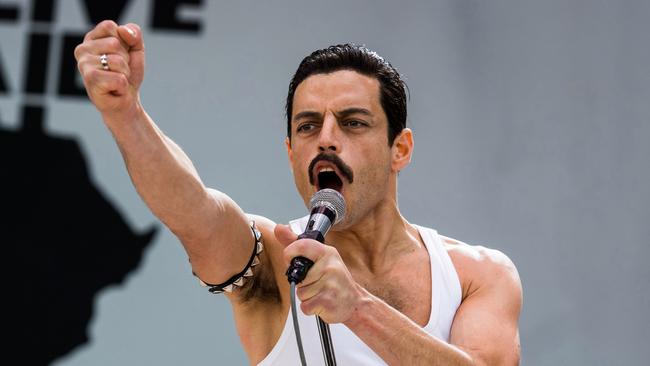Bohemian Rhapsody singalongs make kings of Queen
Mania for Bohemian Rhapsody in Japan and South Korea has propelled the biopic into the box office record books.

In East Asia it is the film that has refused to bite the dust. Indeed, the mania for Bohemian Rhapsody in Japan and South Korea has propelled the biopic about Freddie Mercury and the band Queen into the box office record books.
The obsession has also transformed normally staid movie-going audiences into foot-stomping, tearful crowds belting out rousing Queen hits in cinema singalongs.
Fuelled by waves of repeat viewers, the film has taken more at the box office in Japan (passing $100 million last week and still climbing) and in South Korea ($76m) than in Britain, the band’s home turf. Only US earnings are higher for the most lucrative biopic in history.
So when the contents of the famous envelopes are revealed on Sunday, US time — the Academy revealed yesterday that Queen, featuring Adam Lambert on vocals, would perform at the ceremony in Los Angeles — nowhere will the announcements be followed more eagerly than in east Asia, where it will already be Monday lunchtime.
The film, which has picked up awards at the Golden Globes, has been nominated for five Oscars, including best picture and the best actor category for Rami Malek for his portrayal of Mercury, alongside Lucy Boynton, his British co-star and now real-life girlfriend.
Bohemian Rhapsody has struck a deep chord in countries where the Japanese invention of karaoke is beloved and the vastly popular K-pop and J-pop boy-bands, with their androgynous looks and theatrical flair, have found success and stardom as the musical heirs of British glam rockers of the 1980s.
Japan’s love affair with Queen dates back to the band’s tours of 1975 and 1976, when its 16 sellout concerts, the first outside Britain and North America, set it on the path to global fame.
The attraction was mutual: Mercury cultivated a Japanese garden at home and wore kimonos on stage.
In South Korea, much of their “decadent” repertoire was censored or simply blocked by the prudish military dictatorship in power until 1987.
But the end of repression paved the way for the explosion of K-pop, inspired by the genre-twisting style and antics of Mercury and David Bowie.
Park Jae-sang, the musician known as Psy, cited Mercury as a “role model” for his songwriting and showmanship in interviews about Gangnam Style, his 2012 blockbuster.
Yoichi Sai, 69, a half-Japanese, half-Korean film director, says: “Queen touched Japanese and Korean heartstrings then and now. It makes you feel good now, just like when you first listened to them.
“It’s pop music that’s as good as classic opera. The music is both familiar and pioneering.
“And people also feel for Mercury’s personal tragedy.”
The flamboyant Mercury and his fellow musicians are implausible stars of largely conservative societies where gay rights, particularly in South Korea, are weak. But even Japan’s conservative Prime Minister Shinzo Abe got in on the act when he used his free time on New Year’s Day to watch the film.
The phenomenon stretches far beyond the cinema. The band’s hits feature in commercials and television shows and there has been an explosion in Queen-themed parties in which guests dress in costume. Mercury’s white tank top and tight jeans, as worn by Malek for the Live Aid climax to the film, is the favourite look.
For those seeking to emulate Mercury’s distinctive sound, a Japanese newspaper offered “tricks” from a singing coach — including opening the mouth vertically and pumping a fist while belting out numbers.
And in South Korea, where the obsession with the film erupted before Japan, the Bohemians, a British tribute band, have already been on tour and an exhibition of pictures by Richard Young, the band’s official photographer, drew crowds.
East Asian audiences have not apparently been troubled by the criticisms levelled by some Queen fans in the West that the film makers at times played loose with the chronology and events, or that they downplayed Mercury’s homosexuality.
Indeed, in countries where many young people complain of feelings of loneliness and isolation, often exacerbated by the impact of social media, commentators have pointed to Mercury’s own struggles as an outsider as a major contributing factor in the appeal of the film.
But the core audience has been women in their 40s and 50s who were Queen fans in their youth.
A recent readers’ poll conducted by the Asahi Shimbun newspaper provided revealing data on the devotion and demographics of fans of Bohemian Rhapsody. About 80 per cent were women, two-thirds were aged 40 to 60 and most said they had wept or sobbed during the show.
And repeat viewings were the norm. More than half had seen Bohemian Rhapsody between two and five times; 13 per cent had watched it at least eight times and 3 per cent had taken in 11 or more screenings.
The Sunday Times


